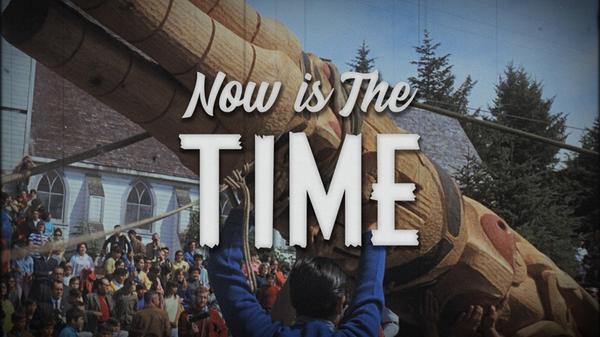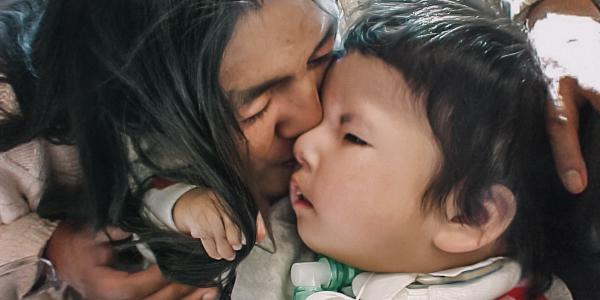This year's TIFF will be premiering two incredible stories of First Nations courage, perseverance and ultimately success.
By Doreen Nicoll
Published August 27, 2019
This year's Toronto International Film Festival (TIFF) will be premiering two incredible stories of First Nations courage, perseverance and ultimately success.
In his short documentary, Now is the Time, filmmaker Christopher Auchter has seamlessly juxtaposed Haida Gwaii post-colonization life bereft of culture, ceremony and celebration with that after August 22, 1969. On that momentous day, the people of Old Massett village celebrated the raising of the first Totem Pole in nearly a century, and they had 22-year-old Robert Davidson to thank.
Church ministers told the people of Haida Gwaii they would never get into heaven unless they got rid of their totem poles. So the poles were cut down and burned. In 1885, potlatches were banned and then in 1911 residential schools made sure any remaining cultural practices was obliterated - at least as far as the government officials were concerned.
Enter Davidson, a young carver who had never undertaken a project of this magnitude. He began by locating a storage box of information from the classical period that had survived the 'dark period.' Then the elders began teaching Davidson carving along, with forbidden songs. Davidson then hired his 14-year-old brother, Reg, to help carve the pole.
Davidson was asked by the elders why he wanted to revive outlawed practices. But when the time came to raise the pole, these same elders showed up in traditional costume and led the traditional pole-raising ceremony. The entire process was completed by three generations of hands from both the Eagle and the Raven clans.
Young Davidson could not possibly have imagined how his gift of a totem pole would usher in the rebirth and resurgence of Haida art, song, dance, and cultural traditions.
Filmed on the traditional territory of the Semiahmoo, Tsleil-Waututh, S'ólh Téméxw and W̱SÁNEĆ First Nations, this is a movie that inspires resilience and determination of both a young Indigenous man and the Haida Gwaii Nation.

'Now is the Time' by Christopher Auchter (NFB 16 minutes, 2019)
Legendary Abenaki director Alanis Obomsawin is releasing her 53rd film, Jordan River Anderson: The Messenger. This documentary is a follow-up to We Can't Make the Same Mistake Twice, chronicling how the short life of one child generated a momentous legacy for Indigenous children. But for some time, even that accomplishment was in doubt due, to a lack of federal government implementation.
Norway House Cree Nation Reserve, Manitoba is over 800 kilometers north of Winnipeg and home to 8,000 people. That's where Jordan River Anderson's family lives. Due to complications during her pregnancy, Jordan's mother, Virgina Anderson, had to be flown to the Children's Hospital in Winnipeg. No one could have known that Jordan would be forced to live there until his death at five years of age.
Born on October 22, 1999, Jordan had Carey Fineman Ziter syndrome, a rare muscular disorder that meant he was ventilator dependent and needed constant care. Being ventilator dependent meant air did not pass over Jordan's vocal cords so he was unable to create sound. But as you'll discover from this beautiful film, Jordan enjoyed his short life as much as any child could be expected to who, has never lived with his family.
Because the Federal and Provincial governments were locked in a dispute over who would cover the cost of Jordan's care, he was never able to leave the hospital and died on February 2, 2005 without ever living in his family home or in the foster home that was available. This happened solely because Jordan was a First Nations child.
Ten months later, on December 20, 2005, Jordan's mother died, leaving behind her husband, Ernest, and Jordan's three siblings.
On December 12, 2007, Private Members Motion 296 in support of Jordan's Principle passed unanimously by a vote of 262: 0 in the House of Commons. Jordan's Principle established that the first level of government contacted would pay for costs to ensure First Nations children received the treatment they needed and then the federal and provincial governments could argue over payment for services later. By January 2016, not a single Indigenous child was able to access funds through Jordan's Principle.
Noah Buffalo-Jackson lives in Montana, Alberta with his mother, Carolyn Buffalo, and his father, Richard Jackson. Sixteen-year-old Noah has cerebral palsy and will need life-long care, but his parents are determined to give Noah the best life they possibly can including attending school. Noah was denied access to the school that his siblings attended because the province wouldn't provide finding since he lives on reserve.
Instead, Noah attended the local school and thrived until grade 4 when he changed schools. But his parents were still unable to get busing so Noah's father, a principal, stopped working so he could drive his son to and from school each day. In fact, Richard has cashed in his pension a couple of times including once to purchase a van to accommodate Noah.
Universal Health Care is for all children, but the Canadian government continued making Indigenous children the exception and this despite the fact it was guaranteed under treaty rights.
Cindy Blackstock, Executive Director of the First Nations Child and Family Caring Society of Canada, fought nine years for Jordan's Principle to be implemented. She did this so Indigenous parents would not have to put their children in foster care and send them off reserve to receive necessary medical treatment off reserve children across the country received without question or qualification.
In April 2016, the Human Rights Tribunal filed a non-compliance order against the federal government, followed by another in September 2016. In March 2017, all parties were brought to the Tribunal to hear issues of non-compliance.
It was shown that a lack of additional funding being built into the 2016 budget meant Jordan's Principle could not be implemented. Even cases meeting all criteria for Jordan's Principle were denied funding.
A lawyer herself, Carolyn made a submission to the Canadian Human Rights commission but her complaint was dismissed.
Undaunted, Buffalo sent the decision to a lawyer who acted on her behalf pro bono and that's when things start to change. The 11-year battle for Noah has reached its end and he will get the special needs transportation he is entitled to.
In May 2017, the federal government received notice that the Tribunal had ordered substantial funding to implement Jordan's Principle.
Jordan's Principle is now law in Canada making the federal government responsible for over 90,000 approved services. To date, 77,000 requests and cases have been approved.
This is a victory for Indigenous children living on reserve. But the law needs to be protected and expanded because Indigenous children only qualify until age 18 if they are not in school or age 21 if they are still in school. So, what does the future hold for these children when they age out?

'Jordan River Anderson: The Messenger' by Alanis Obomsawin (NFB 1 hour 5 minutes, 2019)
If you can't attend TIFF, watch the NFB website for the general release of these documentaries and enjoy a fabulous movie night with meaning.
You must be logged in to comment.
There are no upcoming events right now.
Why not post one?